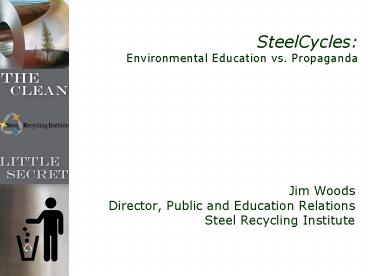SteelCycles: Environmental Education vs' Propaganda PowerPoint PPT Presentation
1 / 19
Title: SteelCycles: Environmental Education vs' Propaganda
1
SteelCycles Environmental Education vs.
Propaganda
- Jim Woods
- Director, Public and Education Relations
- Steel Recycling Institute
2
Who Are We?
- An industry trade association
- Promoting and sustaining the recycling of all
steel products - Educating the solid waste industry, government,
business and ultimately the consumer about the
benefits of steel's infinite recycling cycle
3
Why Environmental Education?
- Citizenship educating a student base who can
effectively participate in a democratic society - Workforce developing problem-solving skills
through scientific methods - Topical providing interesting and relevant real
world issues that are addressed across a variety
of educational disciplines - Sustainabilityshowing students ways to meet
their own current needs without impacting the
ability of future generations to meet their needs
4
Goals of Environmental Education
- To foster clear awareness of and concern about
economic, social, political and ecological
interdependence - To provide every person with opportunities to
acquire the knowledge, values, attitudes,
commitment and skills needed to protect and
improve the environment. - To create new patterns of behavior of
individuals, groups, and society as a while
towards the environment. - Source NAAEE Guidelines for Excellence
5
Making Sure its Educational
- children deserve an education that fully
prepares them for college, work, and citizenship.
That means more than reading, writing, and math.
It means promoting the development of children
who are healthy, safe, engaged, supported, and
academically challenged. - Help students to keep pace with the world around
them. - Engage students to prevent loss and waste of
talent. - Empower children to become productive, engaged
citizens. - Educating the whole child by promoting emotional
and physical well-being as well as creativity and
critical thinking. - Source Association for Supervision and
Curriculum Development
6
Getting It Into the Classroom
- Just because its correct and topical, doesnt
mean that teachers can use it in the classroom - No Child Left Behind
- Lesson Planning
- Documentation of meeting state and national
standards
7
What is a Standard?
8
Elements of a Successful Program
- Fairness and accuracy open to inquiry and
analysis, as well as diversity - Depth fostering awareness and interdependence
- Emphasis on skills building developing life-long
skills for problem solving - Action orientation encouraging learners to use
their knowledge - Instructional soundness based on accepted
instructional techniques - Usability standards based, well designed and
easy to use - Source NAAEE Guidelines for Excellence
9
SteelCycles Environmental Education
- National Recycling Coalition Best Practice in
Education Program - Developed with educators for educators
- Developed in accordance with national and state
educational standards for scientific education - More than a decade of providing educational
reinforcement of national, state and local
environmental platforms through hands-on learning
10
What is SteelCycles?
- Pre-K Grade 12
- Provides educators and community leaders with
stimulating educational tools - For independent use or in conjunction with
existing curricula - Materials available at cost of production
(implied value) - Multi-material approach to teaching integrated
solid waste management, resource conservation,
nature appreciation and recycling
11
Community Activity Sheets (free)
- Primarily focused on elementary students
- Lead young people through exercises, games and
lessons on steel-specific recycling - Designed for duplication and distribution by
recycling coordinators and educators
12
Natures For Me!
- Invites learning in urban or natural setting for
preschool/elementary - Teaches responsibility towards managing natural
resources - Developed with pre-school and Head Start
teachers - Focuses on development of skills in
classification, numbers, representations,
serration, time and spatial relations
13
YES I CAN!
- Multi-material recycling video for pre-K through
grade 3 - Helps students understand need for conservation
and solid waste management - SRI developed a teachers guide to be used with
video for important points discussion - Professionally produced in partnership with Long
Beach, CA
14
ROSCOES RECYCLE ROOM
- Interactive childrens web site
www.recycleroom.org - Edutainment provides fun ways to learn about
steel recycling and solid waste management - Targeted ages 8-13
- Currently more than 18,000 members
- Macromedias Cool Site of the Day
15
EARTH CYCLES
- Kids Teaching Kids
- Middle school Grades 3-5
- Hands on activities dealing with waste reduction,
recycling resource conservation and energy - Modeled for secondary students to mentor children
grades 3-5 - Provides thorough background for both educators
and students
16
ROSCOES TOTALLY CYCLED WORLD
- Interactive CD ROM that integrates science, math
language arts and social studies for Middle
School - Explores natural cycles, economic cycles, and
stages of the recycling process - Children are immersed in activities where they
- calculate time and energy usage
- develop a solid waste plan
- timeline development
- identify organics and in-organics
- categorize elements of solid waste
17
CYCLES FOR SCIENCE
- High school curriculum supplement for secondary
teachers and students grades 9-12 - Designed for meeting educational goals for
learning in biology, chemistry, general/earth
science and physics - Contain project-oriented, multi-material lessons
and hands-on activities - Focuses on commonly taught science principles and
brings them alive through real-life applications - Provides information on integration into
educational programs
18
As We Speak
- Updating the entire SteelCycles education program
- Current state and national standards
- Electronic distribution
- Helping teachers in lesson planning
- Leveraging new, electronic tools
- Increasing rigor
- New topics (i.e. global warming)
19
QUESTIONS???
- Jim Woods
- Director, Public and Education Relations
- Steel Recycling Instittue
- jimw_at_recycle-steel.org

